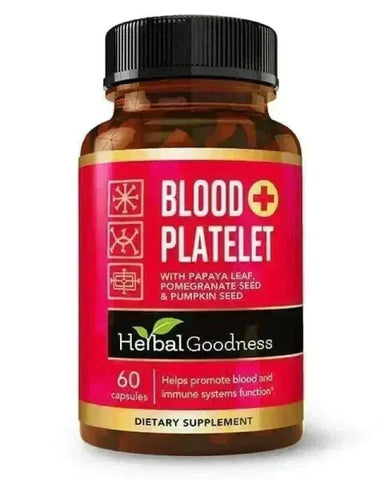Low Platelet Count? Here’s How to Naturally Support Your Blood Health
Platelets are essential for the body's healing process, aiding in the formation of blood clots to prevent excessive bleeding. However, sometimes platelet counts can drop, which may lead to potential issues. While there are various factors influencing platelet count, this article will provide natural ways to support your body’s platelet production, focusing on dietary adjustments, lifestyle practices, and natural alternatives that align with good blood health. By the end, you’ll have a deeper understanding of how to boost your blood health and maintain a balanced lifestyle.
What Are Blood Platelets?
Platelets are small, disc-shaped cells found in the blood that play a crucial role in clotting. They are produced in the bone marrow and circulate in the bloodstream until needed to form a clot. The average platelet count in the body is about 150,000 to 450,000 platelets per microliter of blood, which is considered a normal range.
When blood vessels are injured, platelets gather at the site of injury, sticking together to form a clot and support excessive blood loss. This process is vital for helping cuts, bruises, and other injuries get better.
What Affects Platelet Count?
Several factors can influence your platelet count, including:
- Infections: Certain infections, such as viral illnesses, can temporarily lower platelet count.
- Medications: Some medications, like blood thinners, can affect platelet function.
- Nutritional Deficiencies: A lack of certain nutrients, such as folate, vitamin B12, and iron, can impact platelet production.
- Chronic Conditions: Conditions like autoimmune disorders can lead to changes in platelet count.
- Age: As we age, the body may experience a natural effect in platelet production.
Understanding these factors can help individuals take productive steps to maintain healthy platelet levels.
Diet: The Key to Blood Health
A balanced diet plays a pivotal role in maintaining overall blood health, including platelets. Certain nutrients are essential for supporting platelet production and function. While no specific food will dramatically boost in your platelet count overnight, a nutrient-dense diet can ensure that your body has the resources it needs to support proper platelet levels.
Foods Rich in Folate
Folate (vitamin B9) is vital for the production of red blood cells and platelets. Low levels of folate can affect in platelet count. Incorporating folate-rich foods can help support platelet health. Some of these foods include:
- Leafy greens like spinach and kale
- Lentils and beans
- Asparagus
- Avocados
Iron-Rich Foods
Iron is crucial for red blood cell production, and it also plays a role in supporting platelet levels. Iron-rich foods that can help support platelet health include:
- Red meat (e.g., beef, lamb)
- Poultry (e.g., chicken, turkey)
- Beans and lentils
- Tofu
- Fortified cereals
Vitamin C-Rich Foods
Vitamin C helps your body absorb iron from plant-based foods, making it essential for maintaining healthy blood levels. Foods high in vitamin C include:
- Oranges and other citrus fruits
- Strawberries
- Bell peppers
- Broccoli
- Brussels sprouts
Omega-3 Fatty Acids
Omega-3 fatty acids, found in foods like fish, flaxseeds, and walnuts, support overall blood circulation and health. While they are primarily known for their heart-health benefits, omega also contribute to maintaining proper platelet function.
Lifestyle Practices to Support Platelet Health
In addition to dietary adjustments, certain lifestyle practices can support the body’s natural ability to maintain healthy platelets.
Regular Physical Activity
Moderate physical activity can help boost circulation and blood flow throughout the body. It is important to engage in activities that encourage overall well-being, including:
- Walking
- Swimming
- Yoga
- Light resistance training
These activities not only boost cardiovascular health but also help support the body's natural functions, including the production and circulation of platelets.
Avoiding Excessive Alcohol
Excessive alcohol consumption can negatively affect platelet function. It can impair bone marrow function and hinder platelet production. Moderation is key when it comes to alcohol intake. If you are concerned about your platelet count, it may be beneficial to limit or avoid alcohol altogether.
Staying Hydrated
Staying hydrated is essential for overall blood health. Water helps maintain blood viscosity and supports circulation. Dehydration can lead to thicker blood, which may impact the body's ability to produce and circulate platelets effectively.
Natural Alternatives to Support Platelet Health
While diet and lifestyle practices are fundamental, there are also natural alternatives that people have turned to for supporting blood health. Herbal teas, natural supplements, and other non-invasive methods may offer additional support in maintaining a balanced blood health profile.
Some commonly used natural alternatives include:
- Ginger: Known for its anti-inflammatory properties, ginger can support overall blood health.
- Turmeric: Contains curcumin, which has been shown to support circulation and maintain healthy inflammatory responses.
- Papaya Leaf Extract: Some individuals use papaya leaf extract for its potential to support blood platelet production. It’s important to consult with a healthcare provider before incorporating new supplements or remedies.
While these remedies may offer benefits, it's essential to remember that they should complement a healthy lifestyle rather than replace standard medical advice or treatment.
Platelet-Rich Plasma (PRP) Therapy
Platelet-rich plasma (PRP) therapy is an emerging treatment option that uses a person’s own platelets to stimulate support in areas of the body. In PRP therapy, a small sample of blood is drawn, platelets are concentrated, and then reintroduced into the body to boost tissue repair and regeneration. PRP therapy is used for various purposes, including promoting joint and stimulating hair growth.
While PRP therapy is not a method for directly support platelet count, it is a way to harness the body’s natural repair processes to address specific health concerns. As with any treatment, it is crucial to consult a healthcare professional to determine whether PRP therapy is right for you.
FAQs about Low Platelet Count
1. What is a normal platelet count?
A normal platelet count typically ranges from 150,000 to 450,000 platelets per microliter of blood.
2. How can I boost my platelet count naturally?
To support natural platelet production, include folate, iron, and vitamin C-rich foods in your diet, stay hydrated, and engage in regular physical activity.
3. What foods help promote platelet health?
Foods like leafy greens, citrus fruits, red meat, beans, and nuts are beneficial for supporting healthy platelet levels.
4. What is the function of blood platelets?
Platelets help form blood clots, which helps support excessive bleeding when the body experiences cuts or injuries.
5. How does exercise impact platelet health?
Moderate exercise can boost circulation and overall blood health, supporting healthy platelet function.
Ready to support your blood and platelets naturally?
If you’re looking for additional ways to support your platelet health naturally, consider incorporating Platelet Plus - Capsule 60/600mg into your routine. Designed with essential nutrients, Platelet Plus provides a natural option to complement your diet and lifestyle for overall blood health.
Order now and give your body the support it deserves.
References:
- National Institutes of Health – Platelet Health
- Harvard Health – Blood Platelet Function













